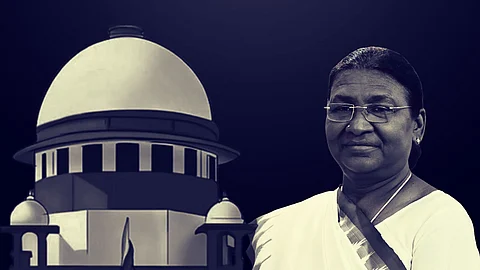

THE SUPREME COURT TODAY expressed concern over the implications of Governors indefinitely withholding the Bills passed by State legislatures, warning that such inaction could render a democratically elected legislature — representing the will of the people —“defunct”.
Hearing the Presidential Reference on the powers of Governors/President under Articles 200 and 201 of the Constitution, Chief Justice B.R. Gavai, heading a five-judge Constitution Bench, asked: “suppose a particular function is entrusted to [the] Governor. When this Court has set aside the constitutional amendment which took away power of judicial review, with those judgments, can we say that however high a constitutional [functionary] may be, if it does not act, the Court is powerless? Suppose an Act [is] passed by [a] competent legislature, [if the] Hon'ble Governor sits over it, then?”
The Bench, also comprising Justices Surya Kant, Vikram Nath, P.S. Narasimha and Atul S. Chandurkar, was responding to Solicitor General Tushar Mehta’s contention that even if a Governor delays action or indefinitely withholds Bills, the Courts cannot step in as actions of the Governor in exercise of powers under Article 200 are not justiciable.
Resuming arguments from Wednesday, the Solicitor General, representing the Central government, said that even if there is a justification to act over the alleged inaction by the Governor in exercise of his powers under Article 200 (giving assent to the Bill passed by the state legislature), it does not confer jurisdiction on the Supreme Court to intervene and adjudicate the issue as its solution lies within the system through political and democratic processes.
Mehta told the Constitution Bench that even “in such a situation, (approaching) the Court is not a solution. The solution is either amending the Constitution or taking recourse to the political process. Not that the buck for every problem will stop at the doorsteps of the Supreme Court.”
He argued that under the political process, a Chief Minister can speak to the Prime Minister and the President and a way out can be found, and that noteverything must reach the Supreme court.
Calling for the exercise of judicial restraint, the Solicitor General argued that such a situation will create a “constitutional hierarchy with every buck stopping here (Supreme Court)”. Pointing out that Article 200 and 201 were non-justiciable, he argued that the non-justiciability was a facet of the independence of the three organs and certain functions are core functions.
“According to you it is totally out of judicial view?,” Chief Justice Gavai shot back at this.
“The Court can't examine the assent, but here the question is [regarding the] decision making process,” Justice Kant added
Unimpressed by the Solicitor General pleading to keep-off the judicial scanner in the role of the Governor under Article 200 and its implications for a democratically elected government in the State, Chief Justice Gavai observed:
“What is the safeguard for a duly elected government? Suppose a bill is passed with two-third majority and the [Governor] just sits over it. This will make the legislature and the government defunct.”
In the course of the hearing, as Mehta hammered the point that actions of the Governor in the exercise of his powers under Article 200 are not justiciable, CJI Gavai said, “Powers under Article 356 are for temporary period and there are in built safeguards that it has to be placed before both the Houses etc. In [Article] 200, if we hold [that the] Governor has complete power to hold for [time] immemorial, what is the safeguard for [the] duly elected?”
Today’s observations were in continuation of what CJI Gavai had said yesterday, on August 19:
“Are we then not giving total powers to the Governor… the government elected by majority will be at the whims of the Governor.”
The observation by the CJI had come in response to the Solicitor General’s argument that the Governor under Article 200 can permanently withhold a Bill and sound death-knell forbit.
As Mehta noted that the entire controversy before the Court was on account of two states – Tamil Nadu and Kerala – CJI Gavai responded, “we have petitions from four states now, Kerala, Tamil Nadu, West Bengal, Punjab...consider a situation where the Governor ought to act, but sits over four years. What happens to [the] democratic set up or the 2/3rd majority by which the State is elected and represents [the] will of [the] people.”
A short background to the Presidential Reference
The Constitution Bench of the Supreme Court is hearing the Presidential Reference regarding the power of the judiciary to prescribe timelines for the President and Governors while dealing with Bills passed by State legislatures.
The Presidential Reference, made on May 15, 2025, questions whether the Court exceeded its jurisdiction by prescribing timelines for the President and Governors to act on State Bills, as well as whether the concept of “deemed assent” violates the doctrine of separation of powers. The Union Government has defended the Reference, stating that the judiciary’s intervention encroached upon constitutional functions of the executive.
The States of Tamil Nadu and Kerala have questioned the maintainability of the Presidential Reference contending that it violates the boundaries of Article 143 of the Constitution, which governs the advisory jurisdiction of the Supreme Court. The Kerala government has argued that such a Reference can only be made if the legal question is still undecided or res integra. It has argued that constitutional questions raised in the present Reference—relating to the powers of the President and Governors under Articles 200 and 201—have already been settled by the Court.